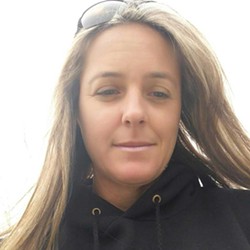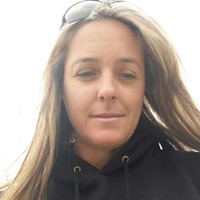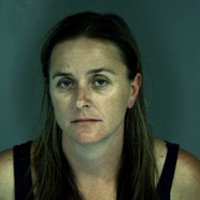'Fair and Impartial'
Defense argues potential Humboldt County jurors may be biased against Marci Kitchen
By Thadeus Greenson [email protected] @ThadeusGreenson[
{
"name": "Top Stories Video Pair",
"insertPoint": "7",
"component": "17087298",
"parentWrapperClass": "fdn-ads-inline-content-block",
"requiredCountToDisplay": "1"
}
]
The last time a criminal trial was moved out of Humboldt County, George W. Bush was president, Barack Obama was just a junior senator and Donald Trump was still six years from recording the first episode of The Celebrity Apprentice.
The year was 2002, and Dianna Mae Preston, then a 58-year-old Trinidad woman, had surrendered to police after ambushing Kevin R. LaPorta in a parking lot outside his business, shooting him four times, then following him into a Chinese restaurant to shoot him twice more, killing him. Preston, who'd carried out the murder under the mistaken belief that LaPorta had molested her granddaughter, was dubbed the "vigilante granny" and the story captured national headlines, ultimately prompting Superior Court Judge Timothy Cissna to rule that Preston couldn't get a fair trial in Humboldt County, spurring the trial's move to Napa County.
In the years since, Humboldt County has seen plenty of high-profile cases, from Blue Lake police Chief David Gundersen facing two dozen charges of drugging and raping his wife, to Gary Bullock torturing and murdering beloved local priest Eric Freed, a crime that garnered international news coverage. But in every case since Preston's, judges have determined the defendants could get a fair shake with a local jury.
Humboldt County Deputy Conflict Counsel Meagan O'Connell is now looking to change that, reportedly having filed a motion arguing the court will be unable to find a fair and impartial jury for her client, Marci Kitchen, who faces charges of gross vehicular manslaughter while intoxicated, based on allegations that she was driving drunk when she fatally struck two 14-year-old girls — one of them her daughter — on Eel River Drive on July 12, 2016 and fled the scene.
Kitchen's case has transfixed and outraged many in the local community since news first broke that the girls — Kiya Kitchen and Faith Tsarnas — were dead and Kitchen was the suspect. But whether the intense news coverage will warrant moving Kitchen's trial remains to be seen, and will ultimately be up to newly seated Humboldt County Superior Court Judge Kaleb Cockrum.
As of press time, the Journal had been unable to obtain a copy of O'Connell's motion, filed Aug. 2, from the courts or attorneys involved in the case. But we do know that a research firm was doing telephone opinion polling of Humboldt County residents in the weeks prior to the filing — the type of research generally necessitated by such a motion.
University of California Hastings College of the Law professor David Levine said it's important to remember that judges are incredibly reticent to move trials for a variety of reasons, meaning the defense generally has to go to extraordinary lengths to show that the particular circumstances of a case, news coverage of it and community sentiment necessitate the move.
There are a number of reasons judges are reluctant to grant change of venue motions, according to Levine. First, there's the ideal that defendants are to be judged by a jury of their peers, and there's no better peer group than the local community. Second, he said, holding a trial in a different county can deprive local community members — including friends and family of the accused and the victims — of the chance to attend, while also burdening another county's jurors with hearing an out-of-area case. Finally, moving a trial is an expensive, cumbersome proposition that will undoubtedly burden both the local court and the court the trial is moved to.
When a judge grants a change of venue motion, he or she is required to notify the state Administrative Office of the Courts, which then recommends two or three counties to possibly host the trial. According to a fact sheet from the Administrative Office of the Courts, the agency looks for communities with similar demographics — ideally close to the court from which the trial is being moved — that would not be "unduly burdened" by taking the trial. The local judge then hears arguments from attorneys in the case as to where the trial should go and decides on a venue he or she thinks will provide a fair and impartial jury, and that can accommodate the impacts of the trial.
Levine said it's important to remember that when a trial moves, the attorneys and judge move with it. Kitchen's trial is slated to span six weeks, making for a lengthy out-of-town stay — and added expenses — for everyone involved. Witnesses will also be subpoenaed and have to travel to testify, incurring more expense for the court. Levine said the Administrative Office of the Courts would also likely look to move the trial to another rural area — noting that it would be odd to move a trial from a rural area to someplace like San Francisco. But most of the state's rural courts are stretched thin, making it difficult for them to devote a courtroom for six weeks to another county's trial.
Consequently, Levine said judges generally put a pretty high burden on the party requesting the venue change. He said it's not enough to show a case has received widespread publicity — the question isn't whether potential jurors know about the case, it's whether they can put aside what they've heard or read about a case to make a judgment based solely on the law and what's presented in court. Consequently, Levine said a successful change of venue motion generally needs to demonstrate three things: that there has been inordinate and pervasive coverage of the case, that said coverage has inflamed the local community and that there is scientific polling data showing that it will be tremendously difficult to find 12 impartial jurors.
Levine said a strong motion would include an overview of the coverage, with a special focus on any information that has been ruled inadmissible at trial or coverage that was deemed to be inaccurate. Then it would also include community reaction to that coverage — letters to the editor, online comments and social media posts — illustrating that the community has become prejudiced toward the defendant. Finally, he said, the motion would include some kind of scientific polling data quantifying the extent to which a randomly selected group of potential jurors know about — and have formed opinions about — the case.
In late July, some North Coast residents received calls from the market research firm Research America inquiring about the Kitchen case. The calls included questions about respondents' media habits, news they'd seen about the Kitchen case and opinions they'd formed about her guilt, as well as a couple of specific aspects of the case. A representative from Research America declined to tell the Journal who commissioned the survey or what it would ultimately be used for.
Levine said this type of polling can ultimately serve a dual purpose. While designed to assess bias in the jury pool, he said the polls can also give attorneys valuable information about strengths and weaknesses in their case, as well as insight into how to identify potential jurors who are likely to be favorable to the defense.
Moving forward, Cockrum is scheduled to hear the change of venue motion Aug. 27. While he could grant or deny it outright from the bench, Levine said judges frequently deny these types of motions without prejudice pending jury selection. In Kitchen's case, this means Cockrum could opt to try impanelling a jury locally with the idea that if a majority of potential jurors demonstrate bias, a potential change of venue would still be on the table.
Looking ahead, Levine said he thinks O'Connell faces an uphill battle to move Kitchen's case out of Humboldt County.
"It's usually pretty tough — judges just don't want to do it," he said, underscoring that the motion — and the polling that likely came with it — are important tools for a defense attorney looking to impanel the most favorable jury for his or her client. "Jury selection, it's a very delicate and very important point in a trial. It's a chess game and who ends up in that jury box makes a huge difference."
It's also worth noting that a change of venue in no way ensures a positive outcome for the defense. In Preston's case, a Napa County jury of nine women and three men convicted her of premeditated murder. She's now 74, serving a life sentence without the possibility of parole at a state prison in Corona.
Thadeus Greenson is the Journal's news editor. Reach him at 442-1400, extension 321, or [email protected]. Follow him on Twitter @thadeusgreenson.
Kitchen Timeline
July 12, 2016 — Kiya Kitchen and Faith Tsarnas are struck by a car while skateboarding on Eel River Drive in Fortuna. Tsarnas is pronounced dead at the scene.
July 13, 2016 — Kiya Kitchen is pronounced dead at Children's Hospital in Oakland.
July 21, 2016 — The California Highway Patrol announces that it is seeking Marci Kitchen for questioning, calling her a person of interest in the case.
Sept. 15, 2016 — The district attorney's office files a complaint charging Marci Kitchen with vehicular manslaughter without gross negligence and DUI causing injury, with special allegations that she caused the girls' deaths and fled the scene after the crash. Kitchen is booked into jail and released after posting $750,000 bail.
May 10, 2017 — Judge John Feeney finds there is sufficient evidence to hold Marci Kitchen to stand trial.
Feb. 28, 2018 — Marci Kitchen's private attorneys Patrik Griego and Ben Okin withdraw from the case after she runs out of money to pay them. The county's conflict counsel's office is appointed to represent her.
Aug. 2, 2018 — Marci Kitchen's new attorney Meagan O'Connell files a motion seeking a change of venue.
Aug. 27 2018 — A hearing is scheduled on the change of venue motion.
Sept. 4, 2018 — Marci Kitchen's trial is tentatively slated to begin, if it remains in Humboldt County.
Comments
Showing 1-1 of 1
more from the author
-
Gloria DeZordo: 1926-2024
- May 5, 2024
-
Failed Leadership
- May 2, 2024
-
'On Siemens Hall Hill'
How an eight-day occupation at Cal Poly Humboldt divided campus
- May 2, 2024
- More »
Latest in News
Readers also liked…
-
Through Mark Larson's Lens
A local photographer's favorite images of 2022 in Humboldt
- Jan 5, 2023
-
'To Celebrate Our Sovereignty'
Yurok Tribe to host gathering honoring 'ultimate river warrior' on the anniversary of the U.S. Supreme Court ruling that changed everything
- Jun 8, 2023


































